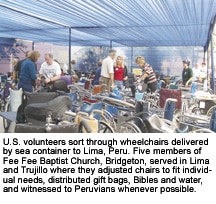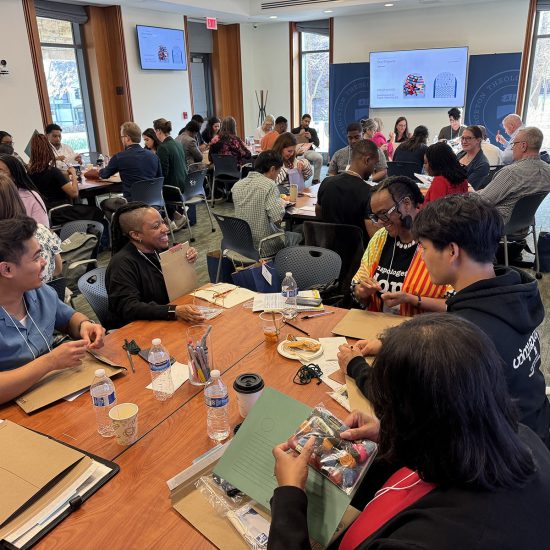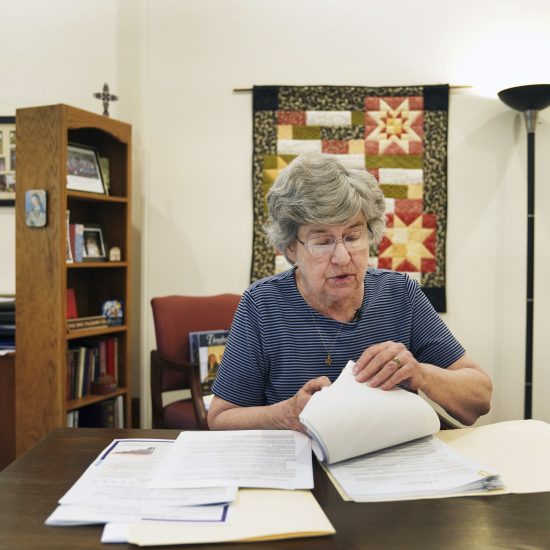By Vicki Brown
Word&Way News Writer
 The Peruvian woman inched down the church aisle, slowly using her arms to propel herself to the altar. She brushed away attempts to carry her or to assist her in any way.
The Peruvian woman inched down the church aisle, slowly using her arms to propel herself to the altar. She brushed away attempts to carry her or to assist her in any way.
As she crawled to a waiting refurbished wheelchair, she reminded the audience that she had been crawling all her life. She wanted to crawl the last few feet to the chair that would change her life.
Five members of Fee Fee Baptist Church, Bridgeton, recently witnessed that change as a team with Wheels for the World. The ministry is part of Joni and Friends, founded by Joni Eareckson Tada in 1979. Tada suffered a diving accident in 1967 that left her a quadriplegic. Since 1979, she has served as an activist and minister to the disabled.
The World Health Organization estimates that some 18 million wheelchairs are needed around the world. Through a broad network of volunteers, Wheels for the World gathers used wheelchairs from across the United States – chairs that cannot be repaired are dismantled for serviceable parts. Salvageable wheelchairs are sent to nine correctional facilities to be repaired by inmates.
Throughout the year, teams of volunteers travel to 62 countries, where they adjust the wheelchairs to fit individuals who need them. Fee Fee members Joe Pewitt and Bob Foster went to Peru as "mechanics." Their wives, Marilyn and Irma, distributed Bibles and gift bags. Lori Fleener, a physical therapist, served as the team's seating specialist to match wheelchairs to recipients.
Although only five Fee Fee members actually traveled to Peru, the entire church helped out. Some contributed money, toothbrushes, gum, soap and other personal items. They gave trucks, dolls, balloons, stickers and other small gifts for children. And they gave lots of leather belts that were adapted as wheelchair seatbelts and shoulder restraints.
Twenty Fee Fee women made seat covers for the chairs and bags to hold gifts.
Three sea containers packed with wheelchairs, canes, walkers, bags, seat covers and "hope kits" – packets of tools for chair maintenance – were sent ahead of the 37 volunteers who made the trip Sept. 29-Oct. 12. The group worked for about a week in Lima, then split into four teams to minister in other parts of the country for another week. The Fee Fee team spent the second week in Trujillo.
The 12- to 14-hour days began with prayer, and prayer permeated everything the group did. The seating specialist on each team prayed with each individual before the search for the right chair began, and prayed with each recipient again after the individual received a wheelchair and gift.
Pewitt and Foster moved wheels, adjusted or removed arm rests, adjusted headrests, and did whatever the specialist suggested. "We fine tuned them," Foster said.
If the lateral support did not match the individual, he added, the mechanics "made one on the spot." They also added seat belts and shoulder straps when needed. "Sometimes we had to completely rebuild the wheelchair to accommodate a person's needs," Pewitt said.
Foster added that, on average, they could adjust a chair in about an hour, although extensive rebuilding sometimes took up to 12 hours. They often had to rebuild an adult wheelchair to fit a child. One of the critical needs Wheels for the World faces is a shortage of pediatric chairs.
In Lima, volunteer "mechanics" depended on Roy, a Peruvian who had suffered from polio as a child, to handle many of the extensive changes. The volunteers called Roy a "super mechanic," although polio had disabled him. "We depended on him to get the hard jobs done," Pewitt said.
Roy and his wife, who is also disabled, live in Villa El Salvador, a neighborhood in which at least one individual in every family is disabled.
The Fee Fee team visited in homes of a few people who were unable to travel to the distribution point. The volunteers assisted a woman who had been bedridden and hadn't been to a doctor in 14 years.
The women distributed gift bags, Bibles, copies of Tada's autobiography and cups of water throughout each day. "Part of our joy was to see children's faces light up when they were given bags," Marilyn said.
Although they went to Peru to distribute wheelchairs, the volunteers also used every opportunity to share the gospel. "A lot of the thrust was relationships," Pewitt said. Peruvian Christian counselors were on hand to share the gospel and to help volunteers who also shared. According to the Fee Fee team, hundreds made professions of faith during the two-week ministry.
Generally more professions are made than the number of people served because the teams often are able to minister to entire families.
Marilyn told about a woman and her four boys – two in wheelchairs – who heard about the ministry on the radio. The woman and boys traveled three days by bus from a small town in the interior. The two older boys, 12 and 15 years old, had muscular dystrophy and were already confined to wheelchairs. The therapist who assisted the family noted early signs of the disease in the two younger sons.
The woman had been a Christian for about four months and only had a New Testament. Irma and Marilyn gave her the last available copy of the complete Bible.
Although only five Fee Fee members made the trip to Peru, about 37 members actively assist the ministry in the St. Louis area. Frank Costello, who attends Fee Fee, serves as volunteer regional director for Wheels for the World in six states, including Missouri, and is a corporate sponsor for the St. Louis area. Retired from the moving and storage business, he developed one of the ministry's primary distribution centers in a warehouse in Bridgeton.
He has coordinated volunteers to pick up wheelchairs, to separate the useable chairs from those that will be salvaged for parts, to clean chairs and other useable items, and to cut vinyl for backs and seats.
The prisons can only handle about 50 chairs at a time. When they are ready for another batch, prison officials call Costello, who ships out parts and chairs. About 100 chairs are stored at the warehouse for emergency use. And it's all done with volunteers. "We raise our own funds to cover costs to pick up, store and distribute the chairs and materials," Costello said.
The warehouse ministers to the community, as well. This year several students who are required to do community service are fulfilling that time at the Wheels for the World ministry. Plans call for a series of maintenance seminars to teach area disabled residents how to perform light service on their chairs themselves.
Individuals interested in donating wheelchairs, canes, walkers or other items, or who would like to get involved in the ministry can contact Costello at 314-291-8998.






